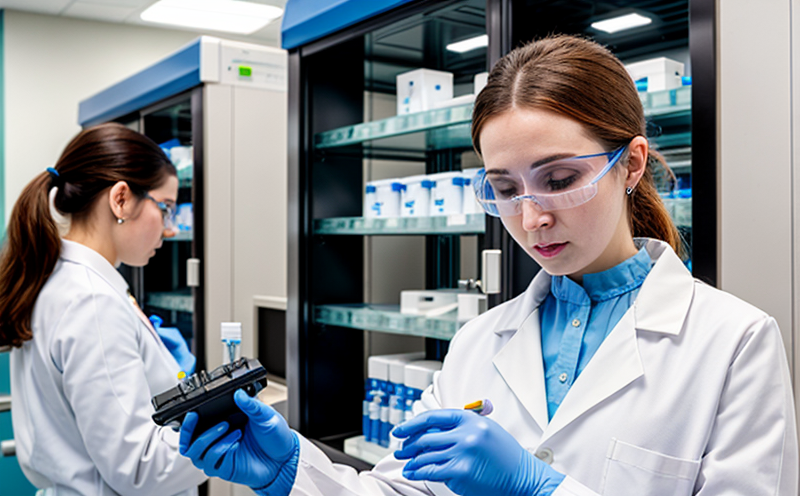Mass Balance Bioanalytical Testing
In the pharmaceutical industry, bioanalytical testing plays a critical role in ensuring product safety, efficacy, and compliance with regulatory standards. Mass balance bioanalytical testing is one of the most essential services within this domain. This type of testing focuses on quantifying drug concentrations and their distribution across various compartments within the body over time.
The process involves collecting biological samples (such as blood plasma or urine) at specified intervals after administering a dose to a subject. By measuring these concentrations, researchers can determine how much of the drug remains in circulation and where it is distributed. This information is crucial for understanding pharmacokinetics—the study of what the body does to the drug—and plays a vital role in optimizing dosing regimens.
Mass balance studies are particularly important during clinical trials when evaluating new medications or formulations. They help identify potential safety issues early on by detecting any unusual accumulation or depletion patterns that could indicate toxicity or inefficacy. Additionally, they provide valuable insights into bioavailability and metabolism rates, which are key factors in determining drug efficacy.
From a regulatory perspective, mass balance studies support the development of robust pharmacokinetic models used for predicting future responses based on current data. These models contribute significantly to reducing uncertainty during drug approval processes by providing reliable estimates of how different populations might respond to treatment.
It's worth noting that conducting accurate mass balance tests requires precise sample handling techniques and sophisticated analytical equipment capable of detecting minute quantities of compounds. Laboratories specializing in this area typically employ high-performance liquid chromatography (HPLC), tandem mass spectrometry (LC/MS/MS), or gas chromatography-mass spectrometry (GC-MS) systems to achieve the necessary sensitivity levels.
The significance of mass balance bioanalytical testing extends beyond just drug development. It also has applications in areas such as pharmacogenomics, where individual genetic variations influence a person’s response to certain drugs; personalized medicine tailored specifically for each patient; and environmental studies assessing the persistence and breakdown of chemical substances introduced into ecosystems.
Given its importance across multiple facets of pharmaceutical research and manufacturing, it is essential that these tests are performed by labs equipped with state-of-the-art facilities and experienced personnel. At our laboratory, we pride ourselves on delivering accurate, reliable results every time using methods compliant with recognized international standards like ISO 17025.
Scope and Methodology
The scope of mass balance bioanalytical testing encompasses several key aspects aimed at ensuring comprehensive evaluation of drug behavior in vivo. The methodology employed involves collecting biological samples from subjects over a defined period following administration of the test substance. These samples are analyzed using advanced analytical techniques to quantify the concentration of active ingredients present.
- Sample Collection: Blood, urine, or other relevant matrices can be collected at predetermined time points post-administration.
- Sample Preparation: Extracted analytes undergo purification steps to remove interfering substances before analysis.
- Analytical Techniques: High-performance liquid chromatography coupled with mass spectrometry (HPLC-MS/MS) is commonly used for detection and quantification of small molecules. For larger biomolecules, techniques like enzyme-linked immunosorbent assay (ELISA) may be utilized.
The collected data points are then analyzed statistically to generate profiles that describe the absorption, distribution, metabolism, excretion (ADME), and elimination characteristics of the substance under investigation. These ADME parameters form the basis for interpreting drug behavior within the body.
Our laboratory adheres strictly to established protocols outlined in international standards such as those provided by the International Conference on Harmonisation (ICH) guidelines or FDA regulations, ensuring consistent quality across all our services.
Benefits
The benefits of mass balance bioanalytical testing are numerous and far-reaching. One primary advantage lies in its ability to provide detailed insights into the pharmacokinetics of a drug candidate early in development stages. This knowledge allows for informed decisions regarding dose adjustments, formulation changes, or even abandonment of unsuitable compounds.
Another significant benefit is enhanced safety assessment. By identifying potential toxicological risks associated with particular concentrations or routes of administration, mass balance studies enable pharmaceutical companies to avoid costly late-stage failures due to adverse events.
In addition to these direct advantages, there are indirect benefits as well. For instance, successful completion of such tests can expedite regulatory approvals by demonstrating adherence to stringent quality control measures required by agencies like the FDA or EMA.
For companies focused on developing biopharmaceuticals, mass balance studies offer additional value through their capacity to assess large-molecule stability and clearance rates. This information is critical for optimizing dosing strategies tailored specifically towards individual patient needs.
The cumulative impact of these benefits extends beyond mere compliance with legal requirements; they represent a strategic investment in product quality and patient care. In today’s competitive marketplace, where innovation drives success, having access to accurate, reliable mass balance data sets pharmaceutical firms apart from their competitors.
Competitive Advantage and Market Impact
Our laboratory's expertise in mass balance bioanalytical testing provides a significant competitive edge over other service providers. With our advanced analytical capabilities and commitment to compliance, we ensure accurate results that can make all the difference in drug development.
- Precision: Utilizing state-of-the-art HPLC-MS/MS systems allows us to detect even trace amounts of compounds, ensuring precise measurements essential for robust data interpretation.
- Compliance: Our adherence to rigorous quality management practices ensures that our results are always compliant with regulatory requirements set forth by bodies like the FDA or EMA.
- Rapidity: By streamlining our processes and leveraging technology, we can deliver timely reports without compromising on accuracy. This speed-to-market capability is especially valuable in today's fast-paced pharmaceutical industry.
These advantages translate directly into better outcomes for our clients. Faster access to reliable mass balance data means quicker decision-making capabilities which ultimately lead to more efficient drug development cycles and higher success rates upon clinical trials completion.
In conclusion, our commitment to excellence in mass balance bioanalytical testing sets us apart as a leading provider within the pharmaceutical sector. Whether you're seeking to optimize your product's pharmacokinetics or ensure regulatory compliance, we have the expertise needed to deliver exceptional service tailored specifically for your needs.





